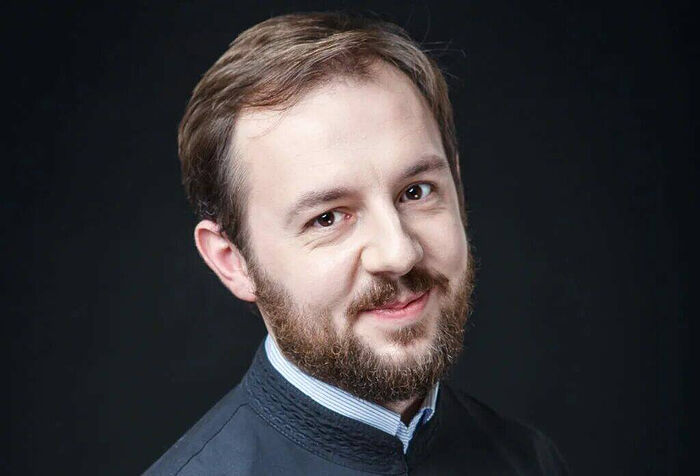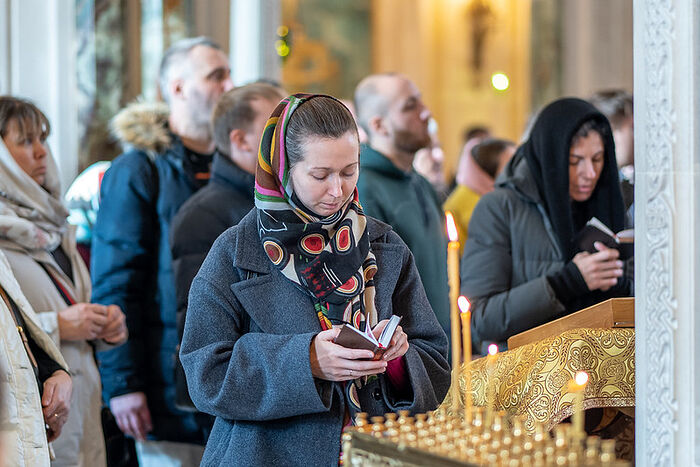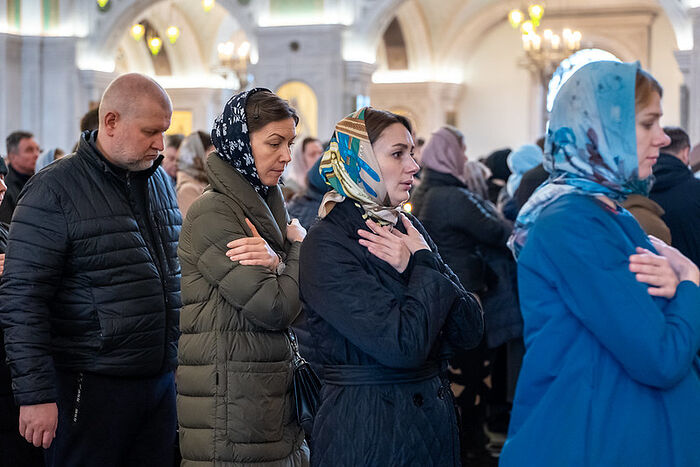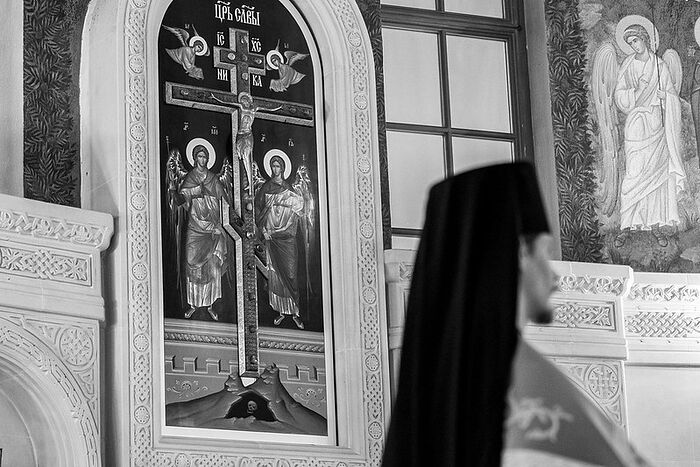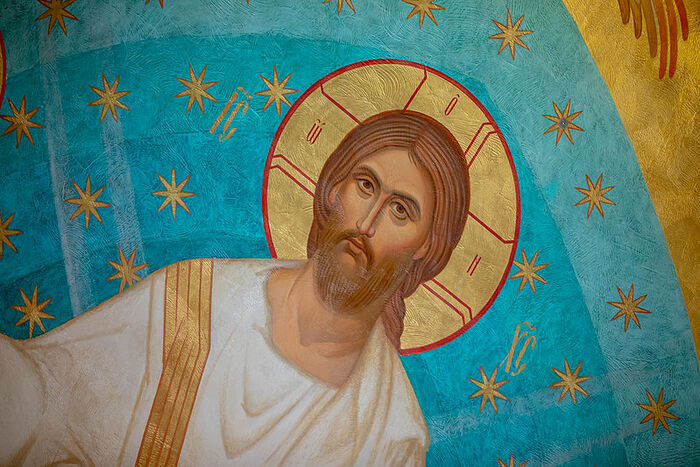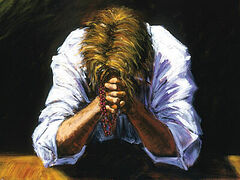In the First Epistle to the Thessalonians of the Apostle Paul we read: Rejoice evermore. Pray without ceasing. In every thing give thanks (1 Thess. 5:16–18). The season of Great Lent is considered to be a time of particulary special repentance and spiritual work. The opinion has taken root that joy during the forty days of Lent is inappropriate and we must just focus on our sins and fight them. But what about the call of the Apostle Paul to rejoice evermore? What is unceasing prayer in our age of superspeed? And why do we often ask God and forget to thank Him? We have analyzed the quote from the Apostle Paul with Priest Anthony Borisov, Associate Professor of the Moscow Theological Academy.
—For me this quote from the Apostle Paul is a motto for life. I would like to fill my life with it, but I do not always manage. I suggest analyzing this phrase word by word. Rejoice evermore. Lent, as many believe, is not a time of joy. How does this correlate with what the Apostle Paul calls us to?
—As you rightly noted, indeed some Orthodox Christians have a warped view of this, confusing the ends with the means. When it comes to repentance, our contemporaries for some reason often believe that repentance, perceived as regret for sins committed, is the goal of spiritual life. This is not true. Spiritual work is not reduced to endless sadness over our past mistakes. And repentance, accordingly, cannot be limited to a sad experience, but should lead us to constructive results. I will explain this idea with the following example, which is probably familiar to many. We are now in the run-up to spring garden work. A person comes to his dacha, looks at his favorite flower bed and he is horrified at how during the winter under the cover of snow various weeds appeared on it. What will he do? Rolling up his sleeves, he will begin to weed his favorite flower bed.
Please tell me what will he do after weeding the flower bed?
—He will plant the crop he needs.
—Right! Because a flower bed cannot be empty. It is pointless to maintain a flower bed in a sterile, but in fact naked, lifeless state. We can say the same about repentance. What is repentance? Let’s turn again to the image of a flower bed. First you need to acknowledge the existence of a spiritual problem, and then start clearing the “soil” of your soul so that something essential, important and beautiful can grow on it. When it comes to spiritual life, we often hear the argument that it is necessary first of all to weed our soul of various defects. But you should not stop and calm down at this stage. Repentance should lead us to holiness, which is not synonymous with sterility. The personality of a righteous man of God is not some “tabula rasa”. Here, for example, we can recall the wonderful words of St. Gregory Palamas, whom no one can accuse of a lack of asceticism. Speaking about repentance and holiness, the saint speaks, of course, about the need to fight against sins and passions. But still, he focuses the attention of his readers on the fact that after a person has gotten rid of the “weeds” of vice, he must nurture the sprouts of holiness, which consist in the development of talents given to us by God: “...We are higher than the angels and created in the image of God... In fact, of all [reasonable] creatures only we, in addition to the mind and reason, also have feelings. What is naturally connected with reason opens up a diverse array of arts, sciences and knowledge: agriculture, building houses and creating things out of nothing (of course, not out of complete non-existence, for this is the work of God alone), all this is given only to people.” So, for St. Gregory Palamas spiritual work, holiness and righteousness in the eyes of God do not consist in attaining absolute purity, which the angels possess, but in attaining a perfection greater than angelic. Namely, in multiplying the talents that we are endowed with by God, with the devotion of these talents to the Lord through serving people.
Let’s reflect on a flower bed again. Imagine: a person worked on his flower bed, weeded it, and planted strawberries there. And they grew. How can we not be happy with what we have achieved? But at the same time, a reasonable person understands that he can do everything to make strawberries grow: fertilize the land, water it, drive away the crows that want to ruin and eat the strawberries. You can do all of the above, and the strawberries still won’t grow for some mysterious reason.
—Unfortunately, that does happen.
—But it has grown and ripened. Isn’t it a miracle? A person who is serious about spiritual life should understand that he can do everything in terms of the tools he has, but the result of spiritual work is in God’s hands. The Lord, seeing the efforts of a person if he is sincere, will surely send him His strengthening grace. But it happens that God, for some reason known to Him alone, seems to be slow and does not give us what we ask Him for. But when we do get what we have put so much effort into, of course, we should rejoice. Not because we are so wonderful, but because, by the grace of God, we were vouchsafed to become His co-workers and the Lord responded to our efforts. We feel the fruit of spiritual work like fragrant strawberries. And we do not rejoice because we are so brilliant and talented, but because the Lord has shown us His mercy. This is what the Apostle Paul call us to—to rejoice: not in our own perfection separated from God, but in the fact that we have managed to become co-workers with the Lord.
—When I see my sins, I am extremely sad about this and very often instead of asking the Lord for help in overcoming it, I finish cultivating my “bed” here, because I see that the “garden” has overgrown with weeds and there can be no strawberries. I lose heart and begin to think that it is not for me. Perhaps this is the root of the miscomprehension of the Apostle Paul’s call?
—Maybe. People tend to generalize, run to extremes and despair or, conversely, lose their minds from pride. In this sense, the testament of Elder John (Krestiankin), our holy contemporary, is extremely useful. Archimandrite John advised many of his spiritual children to work their salvation by performing small good works. It often seems to us (and it is typical of human nature) that it is possible to fulfil a “five-year plan” of spiritual life in three minutes and with such a grandiose good deed to storm the Kingdom of Heaven. We live in the illusion that one day we will perform some wonderful heroic deed and receive the desired reward in the Kingdom of God. But just as it is impossible to run a marathon without preparing for it, so it is impossible to enter Paradise without becoming related to God.
The main difference between Orthodoxy and Western Christianity is that in Catholicism and Protestantism, salvation is mainly about justification before God at His Judgment. People in one way or another operate with legal categories when analyzing the nature of spiritual salvation. The Orthodox tradition does not consider the question of salvation in the categories of the criminal code, but in the category of kinship with God. Indeed, if we consider Christ the Savior’s words about the Last Judgment, we will not find there any hint of the criminal code. Speaking of the end times and the Second Coming, Christ the Savior does not even use the word “judgment”. In the original text of the Gospel there is the Greek word “krisis”—that is, “separation”; and the principle of this separation is that Christ, looking into the face of every person, will either recognize him or not. The reason for this recognition or non-recognition is whether a person has become related to Christ and become like Him. And this similarity is attained through the acquisition of the virtue of mercy, because Christ will ask: “Have you visited Me, helped Me, comforted Me and fed Me?” (cf. Mt. 25:35). He will not ask people about their compliance with the Creed—although this is also extremely important, because the way you believe is the way you live. But the reverse is also important: The way you live is the way you believe.
Let’s revert to small good works. When we come to realize the numerous mistakes that we have made and our shortcomings, we should start reforming the way we untangle tangled threads, for instance. It is useless to fiddle about with a bundle of tangled threads—nothing will come of it. We should take one thread, find the tip, start pulling it out, and so the whole ball will gradually unravel. That is why prudence, graduality, and patience are required in spiritual life.
—Father Anthony, it is logical to move on to the second part of the Apostle Paul’s call: Pray without ceasing. Truly prayer is very painstaking work. We live in the modern world, we are always in a hurry, we can’t tear ourselves away from our cellphones and are always busy with anything but prayer. The words “without ceasing” are very confusing here. And it is quite difficult for modern people to remember God all the time. How can we fulfill this apostolic testament today?
—The Apostle Paul, of course, belonged to a certain culture, a certain religious system. Therefore, he used images that are characteristic, first of all, of the Old Testament language. And when the Bible tells us about righteous people, it uses extremely interesting expressions. For example, with regard to St. Enoch, who according to tradition was taken alive to Heaven, the Bible says that he walked with God (Gen. 5:22) for so many years. So, the prayer that the Apostle Paul speaks about can be understood as the unceasing Jesus Prayer or as the service that, for example, early monks performed, when they hardly ever slept and constantly stayed in church for worship. It is clear that such, in a good sense, specific spiritual practices that monastics use are not applicable to married people. The words of the Apostle Paul were addressed to the entire community of the Thessalonian Church. It is clear that in those days there was no monasticism in Christianity. What then does the Apostle Paul mean? The remembrance of God, Biblical “walking with God”. Moreover, this remembrance of God should not be confused with hysteria or a paranoid inclination that a cruel judge is watching me and wants to catch me in my slightest mistake and punish me severely for it. No, we are talking about something absolutely different. It is about the perception of God, which was given to us by Christ the Savior. When the disciples asked Him to teach them to pray, He gave them the Lord’s Prayer.
God is not a punishing Judge, but a loving Parent. It is quite an applicable image, which will probably be clear to every person. If someone loves his father and mother, then even after their repose he will correlate his actions with the good authority of his parents. The memory of parents, the responsibility for their love are extremely important. And when it comes to a believer, then, by and large, we are talking about the opinion of his Heavenly Parent. We are called to correlate our actions, words and thoughts with our conscience. And our conscience, in turn, must correlate with the commandments of God.
Unceasing prayer or unceasing remembrance, which the Apostle Paul speaks of, is precisely the correlation of your life with God’s commandments. Such behavior is not based on panic or fear that an angry God will punish and destroy you, but on the fact that with your own words and deeds you can sever your relationship with the Heavenly Father Who is dear to you. If I go against His commandments, I will lose the kinship with God that ultimately determines where I am: whether in Paradise or in a state opposite to it.
—If I understand your idea correctly, unceasing prayer in the modern version may look like this: Before saying or doing something, I should think whether I will be ashamed of these words and deeds. And if I understand that what I want to do disagrees with the commandments or with the voice of conscience, this will be my unceasing prayer, won’t it?
—I think so. It seems to me that this format is quite applicable to the modern environment.
—I think that as a priest you have come across the following: people say at confession that they cannot perform both the morning and the evening rules. And we are talking about just thinking about the Lord. Is there some loophole in this?
—Then I would pay attention to the following aspect, since you have touched on the subject of the home prayer rule. Firstly, the very word “rule” should not be understood as a duty, but as a model. The Church has collected for us the best examples of Patristic prayers so that we ourselves can learn to pray to God. Penetrating into the Patristic understanding of prayer, we learn independent prayer, of which we are the authors. Secondly, home prayer should not be perceived just as a daily duty, but as a form of worship.
The prayer-book in the form we know it is a rather late phenomenon. If we look at the Old Believer tradition of our Church, we will see an unexpected thing. Instead of our usual morning and evening prayers, our ancestors would read and sing other prayers. The Midnight Service was celebrated at home in the morning, and Small Compline was read in the evening. Thus, a real service would be performed at home! You understand that with such an attitude to the prayer rule some emphases of this phenomenon can already be seen differently. It’s one thing to skim through familiar texts quickly, and it’s another thing to try and worship at home. Here, of course, some discipline is required, when a person clearly sets for himself some parameters. For example, at 19:20 I put things aside for ten or fifteen minutes, stand in front of my icon and make a verbal offering to God—my home worship—instead of parroting the usual texts.
—Indeed, a person usually just reads his prayer rule and runs on. Some fathers say that in terms of time it is better to pray attentively for five minutes than to “read through” and rattle off everything mechanically. Otherwise, you offend God with your negligence.
—Blessed Augustine writes that if you yourself did not understand what you asked God for, how will God understand what you want from Him?
—Prayer is also gratitude to God. There are three types of prayer: petition, thanksgiving and praise—that is, expressing our respect and reverence for the Lord. We very often ask God, but we thank Him very rarely. We submit intercession lists for the health and repose of our loved ones, but we very rarely pray at services of thanksgiving. Is it a sad tendency of our time and also neglect in relation to the Lord?
—I don’t want to drive our readers into a state of anguish and endless guilt before God. Clearly, we mostly turn to God when we feel bad, scared and have nothing to rely on. But the Lord still, firstly, wants some greater awareness from us, and secondly, He wants us to become co-partakers of His main sacrament—the Eucharist. The word “εὐχαριστία” means “thanksgiving”. The Eucharist, the highest form of gratitude to God, is celebrated during the Liturgy. We gather, headed by a priest, around God’s altar, and in the form of bread and wine we partake of the Body and Blood of Christ, thanking the Savior for the feat of redemption He accomplished. And through partaking of the Body and Blood of Christ we become participants in His redemptive feat. Or, as the Savior Himself says: I am the vine, ye are the branches (Jn. 15:5). Through the Savior we enter the vivifying reality of the Kingdom of God.
True, it is easy to say lofty words. But if we look at the historical environment in which the Apostle Paul was writing about unceasing joy, we will find something to be surprised at. When the Epistle to the Thessalonians was being written, the Apostle Paul was in very difficult conditions in Corinth, preaching Christ every day for a year and a half to local pagans, who were very specific people. The Corinthians were merchants: they loved to quarrel and argue, finding out who was better and who was worse among them. It was a very complicated environment for the Apostle Paul. When it comes to the Epistle to the Philippians (it also contains a call to unceasing joy), the Apostle Paul sent it from the Roman prison, where he was for the first time. While in gloomy dungeons, the Apostle Paul wrote about joy and thanksgiving and called on Christians to imitate him in this spiritual work. It turned out that the Apostle Paul, while in jail, nevertheless thanked God, including for that test. Where did the Apostle Paul find strength for such thanksgiving? He found it in the awareness that he was a co-worker of Christ in the sense of sharing in the Savior’s suffering. It was not without reason that the apostle was imprisoned. He ended up there because he preached Christ to people and did God’s work.
We modern Orthodox Christians, like hothouse flowers, sometimes become very scared when trials befall us. If we live in accordance with our conscience, and our conscience is in line with God’s commandments, and if we try to fulfill what Christ commanded us, but trials fall on our lot, then we must thank God even for this because we are co-workers with Christ. As the author C. S. Lewis reportedly wrote, many paths lead to the Kingdom of Heaven, but they all pass through Golgotha.
—When the Lord gives you something that you wanted, it is very easy to say: “Lord, thank You!” But when He sends you trials, you should muster up your strength. Unfortunately, many get angry and offended and walk away from the Church when things don’t work out the way they want. What can keep a person from abandoning the Church and God?
—No matter how lofty it may sound, here we recall what Christ the Savior said: For where your treasure is, there will your heart be also (Mt. 6:21). If a person perceives God as a genie from a bottle and a fulfiller of desires, then it is clear that if his desires are not fulfilled, then the genie is no longer needed and he needs to look for another, more effective way or a more effective patron who would fulfill these desires…
If we return to the Gospel narrative, we will see how many people followed Christ and how many eventually left Him. These people saw God Incarnate with their own eyes. They saw the miracles He performed before their eyes, and yet they left Him because He didn’t fit their idea of what God should be like. What else can be said here? Indeed, For where your treasure is, there will your heart be also. If a person loves God, and not the “bonuses” that faith in God brings him, there is simply no question here. He trusts God, loves Him, is faithful to Him and will perceive sorrows and trials as part of Divine pedagogy. And if God is perceived just as a tool to achieve certain goals, and these goals are not being achieved, then in this case God is left on the sidelines of life, because in fact He had already been there.
—Then, perhaps, we have no right to claim that we believe in God. We believe in Someone who fulfills our desires. But then we do not accept Him completely, with all the sufferings, with His Providence for us and His lessons for our salvation. So, if someone does not give thanks, he does not truly believe?
—If you are determined to make a diagnosis, then yes, it’s probably so. Or there is faith, but this faith is not in God as such, but in His omnipotence, which must invariably bring me, my dear and beloved self, everything that I ask God for.
—If I still can’t truly thank God, if I get angry or offended when things don’t work out the way I would like them to, but I’m moving towards gratitude, can I say: “Lord, thank You! I may not fully understand Your Providence for me, but I thank You that You have sent me such a test.” Will it be honest? Or, if there is no desire to say “thank you”, is it better not to do it altogether?
—It seems to me that we should talk to God without any crafty diplomacy. It is not without reason that the Book of Job is read in our churches along with other Old Testament books during Holy Week. In a sense, it is a very dangerous text. It speaks about a righteous man who in an instant lost everything he had had—all his children and property, without losing faith. But how is Job’s faith expressed? He says that he will sort things out with God, he will ask and until his last breath demand from God an answer why all this happened to him. We often perceive religious life as a sentimental game of flowers, pussy-willows, eggs and candles. It’s all wonderful, it’s part of our tradition, something that really makes our church life warm and cozy. But it is not what spiritual life amounts to. And spiritual life is a conversation about the most important things: about who I am, what God wants from me, how I can fulfill His will and His Providence. Can I fulfill it? Am I strong enough for this? In this sense, of course, it is very useful to read selected texts of the Old Testament and reread the Gospel. It is worth recalling here the high priestly prayer of Christ the Savior (John 17). Christ is our ideal and guide. Of course, albeit not in such harsh expressions as Job, Christ asks His Heavenly Father why the coming Passion cannot pass Him by. This is a very frank and sincere conversation with God.
When it comes to an individual Orthodox Christian, such a conversation should certainly take place. We should not hide behind a screen of some specific language of prayer. If we really care about something, if we want something from God, if we ask for an answer to certain questions, we must ask and be persistent. As St. John Chrysostom writes, if you ask God for something and ask for something worthy, stand your ground until you get what you want. We don’t have such courage. Maybe the Lord just wants us to show in certain things not humility, but sincerity and determination. Sometimes we don’t want to behave like this, because it’s convenient to hide behind the screen of religiosity and say: “Here is a candle, here is a pussy-willow branch—it seems I’m doing everything right.” We are sometimes afraid to ask the ultimate questions that concern our existence, because we will get answers that will force us to change, reorganize our lives, and change our idea of faith and how to live it. But Christianity is a faith for courageous and mature people. Because there is no other way for us.

